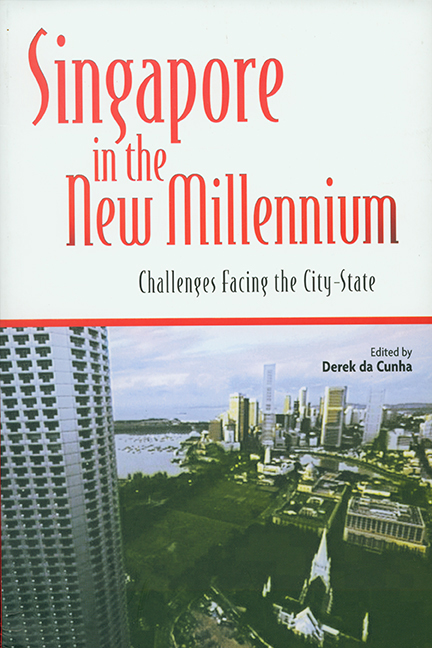Book contents
- Frontmatter
- Contents
- Preface
- Contributors
- 1 The Limits of a City-state: Or Are There?
- 2 External Challenges Facing the Economy
- 3 Governance: Its Complexity and Evolution
- 4 The Future of Civil Society: What Next?
- 5 Relating to the World: Images, Metaphors, and Analogies
- 6 Relating to the World: Images, Metaphors, and Analogies
- 7 Education in the Early 21st Century: Challenges and Dilemmas
- 8 Reframing Modernity: The Challenge of Remaking Singapore
- 9 National Identity, the Arts, and the Global City
- 10 The Media and the Flow of Information
- 11 Conclusion
- Index
Preface
Published online by Cambridge University Press: 21 October 2015
- Frontmatter
- Contents
- Preface
- Contributors
- 1 The Limits of a City-state: Or Are There?
- 2 External Challenges Facing the Economy
- 3 Governance: Its Complexity and Evolution
- 4 The Future of Civil Society: What Next?
- 5 Relating to the World: Images, Metaphors, and Analogies
- 6 Relating to the World: Images, Metaphors, and Analogies
- 7 Education in the Early 21st Century: Challenges and Dilemmas
- 8 Reframing Modernity: The Challenge of Remaking Singapore
- 9 National Identity, the Arts, and the Global City
- 10 The Media and the Flow of Information
- 11 Conclusion
- Index
Summary
The volume of literature on Singapore society, politics, and economics continues to grow at a steady rate. Few other countries of similar size have been so extensively written on. The reason why Singapore continues to come under the microscope of intellectual analysis is that it is unique in many ways. From the way it is governed to the way it conducts its commerce, Singapore has generally charted its own course different from what is generally pursued by most other countries.
Another book on Singapore can only be justified if there are new things to say. In that respect, if this book does reveal to the reader something new, it is a consequence of the impact on Singapore of the significant changes taking place in an increasingly interdependent world, and the equally significant geopolitical changes that have taken place in Singapore's own neighbourhood — Southeast Asia. These changes have occasioned economic, political, intellectual, and societal responses from both the Singaporean state and people, whose defining feature is to keep pace and anticipate change.
This book grew out of a one-day conference of the same name organized by the Institute of Southeast Asian Studies in August 1999. Eight papers were presented at that conference, of which seven were selected, revised in 2001, and now appear as chapters in this book. The editor then commissioned three more chapters, so as to make the book more rounded. The conclusion draws together some of the major themes in the various chapters, highlighting some key challenges that Singapore is likely to face in the years ahead and also reflecting on the significance of the 2001 general election.
The editor would like to thank Mr Jesse Cortes, a graduate student at the University of California, San Diego, for assistance in editing this volume. He would also like to thank the authors of the various chapters for their patience in waiting for the book's publication.
- Type
- Chapter
- Information
- Singapore in the New MillenniumChallenges Facing the City-State, pp. viiPublisher: ISEAS–Yusof Ishak InstitutePrint publication year: 2002

